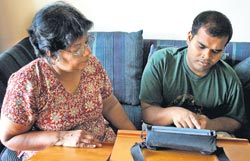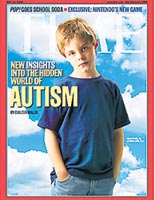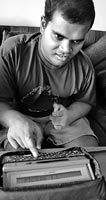
Breaking free from a silent abyssAutism took away his voice but could not quell his spirit. Smriti Daniel meets poet, writer and advocate Chandima Rajapatirana and his mother Anoja. Pic by M.A. Pushpa Kumara. Michigan, 1999: Chandima Rajapatirana has a presentation to make on the morrow. Unbearably nervous, he dashes around the hotel room he is sharing with his parents, Anoja and Sarath. Used to accompanying their son to various conferences on autism across the U.S, both of them have forgotten that this event actually marks his first presentation. Chandima himself, however, is all too aware. “There was just no living with him,” Anoja recalls, remembering that getting any rest proved impossible that night. Morning finally comes, and soon Chandima is on stage, listening as his essay ‘On Being Mute’ is read out to his audience. “Being mute is like having your brain gouged out,” he begins. “Autism/Apraxia took away my voice, and a world that equates muteness with stupidity took everything else.” His audience listens intently. Many among them are autistic themselves, and it is for them that Chandima speaks.
“There are many of you who still deny me my brain, but there are more of us now. More of us mute people who have found our voices through Facilitated Communication, and our awesome voices insist that you deny our abilities no more.” His short essay ends with a question: “How many people lived alone and abandoned? How many lives lost? Hear me now. Ignorance and prejudice still hold too many of us in that silent abyss.” In moments, the entire audience is on their feet, applauding loudly. Anoja is overcome, her vision blurred by tears. This is a moment she will never forget. “My son, who they said was going to have to be institutionalised, brought 250 people to their feet,” she remembers. All the sweeter for the struggle that preceded it, such moments are a vindication of a war that Chandima and his family have fought and will continue to fight every day of their lives. Their enemy is one they cannot decisively defeat – Chandima will always be autistic – but he and his family have discovered that though the war goes on, there is always a battle or two to be won.
Diagnosed with autism when he was four years old, Chandima was the youngest of three children. It took his parent two years of doing the rounds of various specialists, explaining that their son wasn’t developing normally, before they were handed a diagnosis. “They made it sound like a death sentence,” Anoja recalls. Her son, they told her, would have to be institutionalised, his intelligence would undoubtedly be significantly below average and even more devastating - he would never be capable of loving or being loved. For Anoja, this was unthinkable. “I said, ‘You are wrong. If my son were a rock, he would know he was loved…You can’t look at a four-year-old and know if he’s going to be a doctor! How can you tell me that my son is going to be in an institution?’” Her resolve would be tested in the years to come. Chandima appeared unresponsive to treatment, and a string of experts had little hope to offer. Tests on the entire family yielded little or no information about what had caused the condition. Various schools and institutions offered programmes that promised much and delivered little. Unable to receive feedback of any sort from their son, Anoja and Sarath tried anything, however extreme, that seemed to have even the smallest chance of working. For Chandima, those years seem to have taken on the proportions of a nightmare. Many years later, he would say in a presentation: “As an experiment, just try keeping your mouth shut for a day. Just try keeping your mouth shut while they talk about you, telling your mother to put you away in an institution. You want to scream ‘no, no, no,’ but you are mute.” Looking back now, he types slowly, “mom cried a lot…but my bitter life got bitterer when she started trying to fix me.” Some minutes later he relents, “berating you is great fun,” he says to Anoja, “but I know you were leading me to a better life.” Understandably, it is a time that neither mother nor son like to talk about too much. “I wish I knew then, what I know now,” says Anoja simply. Chandima types, “Mom says I never looked like I made the effort. I looked at things peripherally, I moved my hands jerkily, and I appeared not to understand requests. Because of my apraxia I could never make my body obey my brain’s requests; how could I make it obey mom’s requests?” It would be many “dark years” before the Rajapatiranas would stumble across Facilitated Communication (FC) and a whole year before Chandima became comfortable with the technique. FC was designed to help people with limited or no speech to communicate. In theory it was simple – Chandima would type out whatever he wanted to say using a keyboard, or a simple cardboard equivalent. In practice it was much harder. He needed a facilitator for both emotional and physical support, and the process was painstaking and long drawn out. Like many others’, his apraxia limited his motor functions, making it difficult for him to manage the co-ordination of the hand and finger movements required to type for long on his own. Often his facilitator would have to support his wrist or forearm. But all this strain paled beside the heady liberation of finally being able to communicate. For Chandima, then 17, it was a coming of age like no other. “My brain lit up like a neon sign, finally I could talk!” Anoja quotes Dickens, “it was the best of times and it was the worst of times.” The best, because for the first time in his life, her son was actually communicating with his parents. But it was also impossibly painful. “As time had passed and nothing would work, I had hoped that Chandima didn’t know what he was missing,” says Anoja, “but that first year, we found out that Chandima knew to the last dregs what he was missing...he was in so much pain and despair – and that made it very hard.” She pauses to look at her son, stretched out beside her on their sofa. “But I am so glad that you can talk to us. We laugh and joke, and fight and shout, and I am so glad we can.”
One of the first things he said when he could type was: ‘Autism has held me hostage for 17 years.’ “We immediately got him a psychologist,” says Anoja, “we figured someone who had been held hostage for 17 years would need one.” Another momentous event was the making of a video to send back home to the family. “Here’s your chance to talk to your family, say what you’ve always wanted to say,” Anoja told him. He did. His aunts, uncles and cousins, (gathered together in Sri Lanka to watch the video) watched in amazement as Chandima typed: “I want to say I love you.” Anoja wasn’t home when they called, but Chandima’s keen ears picked up the sound of the answering machine as it took the message in another room. Rushing to stand beside it, unable to pick up the phone and talk, he listened to his family’s outpouring of joy. “They were shouting and laughing and crying…that was such a wonderful tape. My brother’s voice could be heard the loudest, ‘cheers for the mother, cheers for the mother,’” remembers Anoja smiling. After having spent years listening to what the experts had to say, Anoja and Sarath could now listen to the opinion that counted the most – Chandima’s. His intelligence was no longer in doubt, nor was his ability to love. And the insights he and other FC users offered would revolutionalise the way their diseases were understood. As a gifted writer, Chandima put into words some of his most difficult experiences: his hyper-sensitivity to sound, his constant struggle with anxiety, his tendency to get disoriented in crowds, and the strange feeling of losing his body. “I need to sit, loll or move to know where my body is,” he typed, adding “if I am just standing it is scary, frustrating just trying to stand. I lose my body and must run to feel it.” On another occasion he would explain, “Shouting is a symptom of my tension, my throat tightens and I shout but I get stuck in it even though I want to stop.” For Anoja, Chandima’s primary caregiver, FC allowed her to explore possible solutions to such situations. When discussing his sometimes overwhelming rage, she asks him, ‘What helps you get unstuck?’ ‘Knowing you love me anyway,’ he responds. At 33, things aren’t always as simple for Chandima. He longs to stand on his own feet, something that is not possible as of now. Anoja feels his pain keenly. “I want him to have the life that he says he wants to have. After all, that is what I want for my other two children, and why should I want anything different for him?” That having been said, “I am tempted to ask sometimes: why can’t you be happy to sit in front of the television, like everybody else in the world?” But for Chandima it seems there will always be another mountain to climb. Talking, the dearest wish of his heart, continues to elude him. “Speakers open their mouths and words pour out. I open my mouth and scream. Your sounds emerge modulated, shaped words. Mine emerge un-modulated, unshaped, un-understandable squeals. The reality is that I sound like an animal. It is an awful thought….The awareness of how bizarre I sound kills the determination to speak…Tussling with my mouth while trying to talk maddens me; I suspect most people don’t have to do that.” “I have a mind that is intelligent and a body that is stingy with its obedience to my mind’s dictates,” Chandima types. And it is a situation that is common to many individuals not only with Autism Spectrum Disorders but also with diseases like cerebral palsy. “Isolated by the inability to communicate, and the prejudice and ignorance of the people in their lives, too many Helen Kellers and Stephen Hawkins are lost to world,” Chandima said, highlighting the situation in yet another presentation. “It is best,” he suggested, “that society not base its judgement of a person’s intelligence on what that person may be able to do or say.” Today, Chandima is a poet, writer and advocate. Having moved back to Sri Lanka after many years in the States, he and Anoja are volunteering with organisations like the Chitra Lane School in an attempt to familiarise other non-verbal individuals and their families with FC. Being an advocate in particular is not an easy role, as Chandima is far from being comfortable in the spotlight. Even something like making sustained eye contact is challenging and the temptation to look away is strong. “I have heard that in Thailand it is considered rude to stare fixedly at the person you are talking to,” he says wryly, “maybe I should move to Thailand.” Chandima doesn’t consider himself a pioneer, and will resist any sort of glorification quite firmly: “We don’t want to be your heroes or your victims – we want to be your equals.”FC was a door which was opened for him, he says, and one he ran through joyfully. Now he struggles to do the same for others. “Autism is terrifying to others because they don’t know that we are normal inside…I am often told that my special contribution is that I am very self-aware, and that I am willing to reveal my vulnerabilities,” he admits. “I do so, only in the hope of helping others.” |
|| Front
Page | News | Editorial | Columns | Sports | Plus | Financial
Times | International | Mirror | TV
Times | Funday
Times || |
| |
Copyright
2007 Wijeya
Newspapers Ltd.Colombo. Sri Lanka. |


